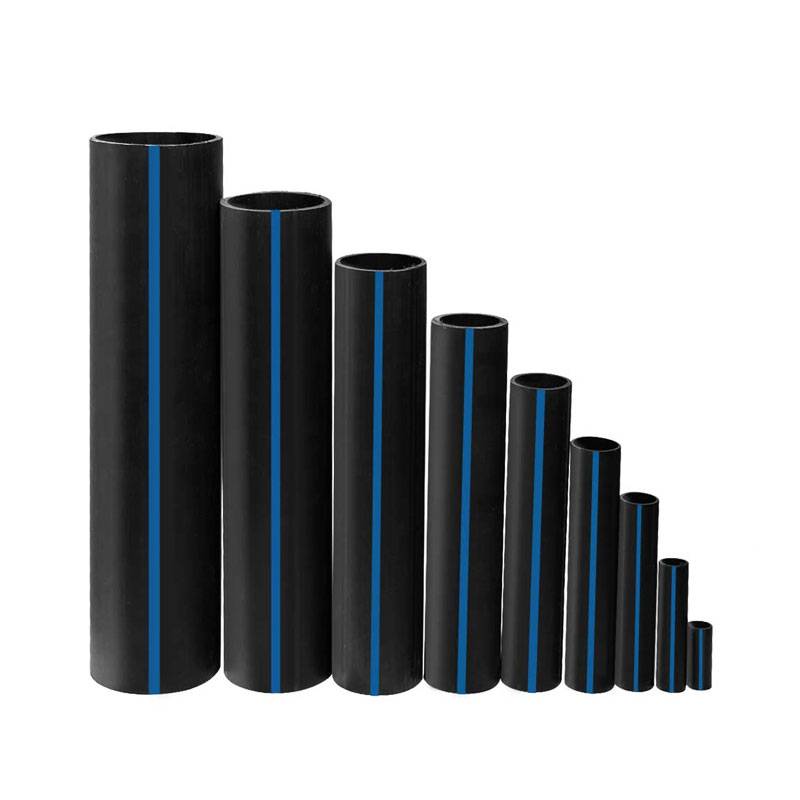Recognizing the Secret Perks of HDPE Pipe for Water and Wastewater Management
Using HDPE pipe in water and wastewater monitoring presents various benefits that warrant factor to consider. Its outstanding longevity and long life-span make it a recommended option for many projects. Furthermore, the material's resistance to rust and chemical damage enhances its dependability in numerous environments. Nevertheless, the benefits extend past just durability and resistance. Discovering its cost-effectiveness and ecological impact reveals much more engaging reasons for its widespread fostering in contemporary infrastructure
Extraordinary Toughness and Durability

HDPE pipe sticks out for its extraordinary durability and longevity, making it a favored option in water monitoring systems. Constructed from high-density polyethylene, these pipelines can stand up to substantial pressure and stress, guaranteeing trusted performance with time. Their durable nature permits them to endure severe ecological conditions, consisting of temperature level fluctuations and dirt motions, which can cause various other materials to fall short.
The life-span of HDPE pipelines frequently surpasses half a century, giving an economical service for municipalities and industries alike. In addition, the material's lightweight buildings streamline installation, decreasing labor costs and durations. This resilience reduces the need for frequent fixings or replacements, even more boosting its economic charm.
In water monitoring applications, the reliability of HDPE pipes means fewer disruptions and improved solution continuity, making them essential to lasting framework development. The mix of longevity and durability solidifies HDPE's function as a cornerstone in reliable water management remedies.

Resistance to Deterioration and Chemical Damage
While several materials yield to rust and chemical damages gradually, HDPE pipes display remarkable resistance, making them ideal for various water management applications. This strength stems from the molecular structure of high-density polyethylene, which is naturally non-reactive and does not wear away like steels or weaken from direct exposure to harsh chemicals. Consequently, HDPE is highly efficient in atmospheres with aggressive compounds, such as wastewater systems that may include acids, bases, and natural solvents.
Additionally, HDPE pipes can endure environmental variables such as dirt acidity and saline conditions, better improving their suitability for diverse applications (Pipe Supplier American Plastics Midland). Their capacity to maintain structural integrity over time decreases the risk of leaks and failings, which is critical in making certain the safety and integrity of water distribution and wastewater monitoring systems. Consequently, the resistance to rust and chemical damages markedly adds to the overall performance and long life of HDPE piping services
Cost-Effectiveness and Economic Benefits
When considering the financial effects of water administration systems, the cost-effectiveness of HDPE pipes comes to be obvious. These pipelines supply reduced installment and maintenance prices compared to conventional products like steel or concrete. Their light-weight nature simplifies transport and installment, leading to minimized labor costs. Furthermore, HDPE pipes display a lengthy life-span, typically surpassing half a century, which equates to fewer substitutes and long-lasting savings.
The resistance of HDPE to rust and chemical damage reduces the demand for costly fixings and substitutes. The pipelines likewise sustain efficient water circulation, lowering energy expenses linked with pumping systems. By reducing leaks and water loss, HDPE pipes add to considerable economic advantages for municipalities and sectors alike. In general, the initial financial investment in HDPE piping can produce substantial monetary returns over the life expectancy of the water monitoring system, making it a prudent option for lasting framework growth.
Ecological Sustainability and Minimized Impact

Versatility and Flexibility in Installation
Due to their one-of-a-kind properties, HDPE pipes use impressive flexibility and flexibility in setup, making them ideal for a wide variety of applications. Their lightweight nature permits much easier handling and transport, reducing labor prices and installation time. HDPE pipes can be bent and formed to fit various surfaces and project demands, which is specifically beneficial in testing environments.
In addition, their resistance to corrosion and chemical damage enables installment in diverse settings without the demand for specialized protective finishings. The capability to fuse joints produces a constant, leak-free system, boosting the general integrity and dependability of the installation. HDPE's versatility likewise suits ground movement, minimizing the risk of damage in areas prone to shifting dirt. Overall, these features make HDPE pipelines not just functional but also a recommended selection for water and wastewater administration systems.
Frequently Asked Concerns
Exactly How Does HDPE Pipe Contrast to PVC in Water Administration Applications?
HDPE pipe provides remarkable flexibility, resistance to corrosion, and toughness contrasted to PVC. Its lighter weight promotes much easier installation, while its long life-span decreases replacement expenses, making HDPE a preferred choice in water monitoring applications.
What Is the Life-span of HDPE Water Lines Under Common Conditions?
Under normal problems, HDPE pipes can have a lifespan varying from 50 to 100 years. Their toughness and resistance to deterioration add to their long-lasting performance in various applications, making them a reputable option for framework.
Are HDPE Pipes Recyclable After Their Solution Life?
Yes, HDPE pipes are recyclable after their service life. hdpe pipe in stock Midland TX. They can be refined and repurposed right into new products, considerably lowering environmental impact and promoting sustainability within the industry, making them a green selection for piping solutions
What Is the Installation Process for HDPE Water Lines?
The installment procedure for HDPE pipelines entails site preparation, trenching, pipe blend or mechanical signing article source up with, backfilling, and pressure screening. Proper strategies ensure a long lasting and effective system for delivering water and wastewater effectively.
Can HDPE Pipes Be Made Use Of for Both Drinkable and Non-Potable Water Equipments?
Yes, HDPE pipelines can be made use of for both safe and clean and non-potable water supply. Their adaptability, longevity, and resistance to rust make them suitable for various applications, ensuring you can check here risk-free and efficient transport of water in different contexts.